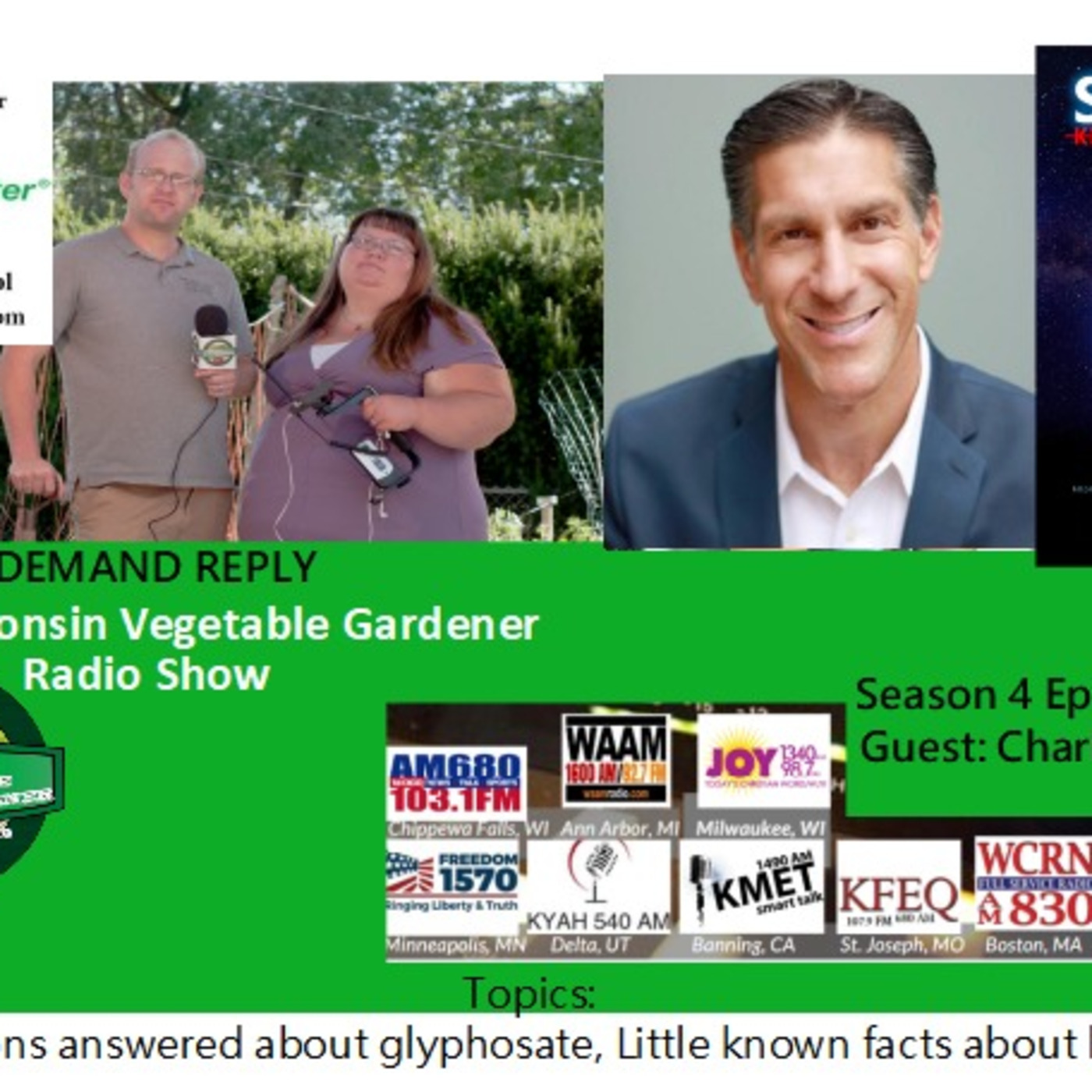S4E21 Glyphosate questions answered, lesser known landfill facts, Guest Charles Malki - The Wisconsin Vegetable Gardener radio show
- Author
- The Gardening with Joey & Holly radio show (The Wisconsin vegetable gardener)
- Published
- Mon 27 Jul 2020
- Episode Link
- https://www.podomatic.com/podcasts/thewisconsinvegetablegardenerpodcast/episodes/2020-07-27T04_00_00-07_00
The Wisconsin Vegetable Gardener Radio Show from
March – Oct weekly
Heard on Joy 1340 AM & 98.7 FM Milwaukee, WI Saturday mornings 7-8 AM CST https://tunein.com/radio/Joy-1340-s30042/
Heard on WCRN 830 AM Westborough/Boston, MA Saturdays 8-9 AM EST https://tunein.com/radio/WCRN-AM-830-Full-Service-Radio-s1112/
Heard on KYAH 540 AM Delta/Salt Lake City, UT Saturdays 1-2 PM MST Reply Sundays 9-10 PM MST https://www.yahradio540.com/listen-live/
Heard on KDIZ 1570 AM Minneapolis, MN Saturdays 4-5 PM and replay Sundays 2-3 PM CST http://player.listenlive.co/57071
Heard on WAAM 1600 AM & 92.7 FM Ann Arbor, MI Sundays 7-8 AM EST https://tinyurl.com/p68cvft
Heard on WOGO 680 AM & 103.1 FM Chippewa Falls, WI Sundays 9-10 AM CST https://www.christiannetcast.com/listen/player.asp?station=wogo-am
Heard on KFEQ 680 AM & 107.9 FM St. Joseph/Kansas City, MO Sundays 10-11 AM CST http://www.680kfeq.com/live-stream/
Heard on WNAX 570 AM Yankton SD Sundays 10-11 AM CST https://tunein.com/radio/Radio-570-s36447/
Heard on WRMN 1410 AM & 96.7 FM Elgin/Chicago, IL Sundays Noon-1 PM CST https://www.wrmn1410.com/
Heard on KMET 1490 AM & 98.1 FM Banning, CA Tuesdays 9 - 10 AM PST https://www.kmet1490am.com/
Check out https://thewisconsinvegetablegardener.com/
Email your questions to [email protected]
Or call 24/7 leave your question at 1-800 927-SHOW
In segment one Joey and Holly answer four questions about glyphosate
What is glyphosate?
glyphosate is a broad-spectrum systemic herbicide and crop desiccant. It is an organophosphorus compound, specifically a phosphonate, which acts by inhibiting the plant enzyme 5-enolpyruvylshikimate-3-phosphate synthase.
Glyphosate is a non-selective herbicide, meaning it will kill most plants. It prevents the plants from making certain proteins that are needed for plant growth. Glyphosate stops a specific enzyme pathway, the shikimic acid pathway. The shikimic acid pathway is necessary for plants and some microorganisms.
What is it mainly used for ?
When used precisely and according to label instructions, herbicides help to keep weeds from competing with crops for water, sunlight and nutrients. Glyphosate helps farmers and homeowners control weeds in many different kinds of plantings
How does it work?
Glyphosate-based herbicides all work on the same biochemical principle – they inhibit a specific enzyme called EPSP synthase [source: Funke et. al.]. Without that enzyme, plants are unable to produce other proteins essential to growth, so they yellow and die over the course of several days or weeks. A majority of plants use this same enzyme, so almost all plants succumb to glyphosate.
Why do some feel it is unsafe?
Although generally believed to be less toxic to humans than other herbicides, some experts have concerns about the possibility that it may disrupt endocrine activity in people [source: U.S. National Institutes of Health]. Other animals, including frogs and fish, may also suffer negative effects.
Scientists continuing to study glyphosate have noted increases in Non-Hodgkin lymphoma, a type of cancer, in some people exposed to the chemical [source: Dixon]. The World Health Organization's International Agency for Research on Cancer stated in March 2015 that it believed glyphosate is "probably carcinogenic to humans."
In segment two Joey and Holly go over lesser known facts about landfills
There are fewer landfills today. In the 1980s, the United States was home to more than 7,600 dumps but that number was slashed by more than 75 percent – to 1,908 – by 2009. That’s partly because the average landfill grew substantially (approx. 4x) in size.
It doesn’t mean we’re producing less waste. Trash production has actually tripled in the U.S. since 1960! And, contrary to popular belief, much of this waste isn’t decomposing quickly, if at all. Landfill excavators have found 40-year-old newspapers with print that’s still completely legible.
We have room to gro(continued)
